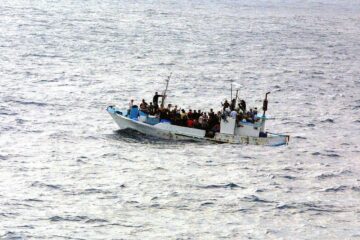![]()
Introduction:
The Power of Diplomacy and Dialog
Diplomacy is the art and practice of conducting negotiations between representatives of states. It usually refers to the conduct of international relations through the intercession of professional diplomats with regard to a full range of topical issues. [1]Diplomacy entails influencing the decisions and conduct of foreign governments and officials through dialogue, negotiation, and other nonviolent means[2]. One needs to remember that diplomacy may be punitive in the sense of sanctions and other policies. Diplomacy and diplomatic policies have been a part of our history from ancient times where every treaty signed in history was a part of the diplomatic policy of the state.
Diplomacy is an important part of foreign policy even today where various nations sort out disputes through dialogue and diplomatic policy. Some might say that adhering to a policy of diplomacy might not solve all problems in an international set up but to tell you the truth this is not the case. Take the Cuban missile crisis for example where if the missiles reached Cuba it would have led to a nuclear war and the world war 3 but president Kennedy opted for secret negotiation with Khrushchev regime who in return to the withdrawal of its missiles from Cuba, the US should promise not to invade Cuba and also withdrawal its missiles in Turkey. These secret agreements were the main possible prevention of the Cuban crises and stating the importance of giving diplomacy a chance. If such a crisis could be avoided then you can only imagine the power of Diplomacy.[3]
Talking from an Indian standpoint India has faced Pakistan three ties in war. The first Indo-Pakistan war was fought for Kashmir, the second Indo Pakistan war in 1971 between the West and East Pakistan which resulted in the modern-day formation of Bangladesh and the third and the last war that is the Kargil war was fought over a fight of a glacier but what was the result India and Pakistan relations are still not stable where even today both nations have tensed relations and fight over Kashmir and soldiers die across the line of control protecting our borders. Now compare this with the 73-day standoff between India and China over Doklam was resolved through “diplomatic maturity”.
The then foreign minister Sushma Swaraj said that the Doklam issue was resolved through “diplomatic maturity without losing any ground and status quo has been maintained since Indian troops pulled back[4]” Further in the ongoing Indo-China dispute Consensus achieved after ‘effective communication’ through diplomatic and military channels, says Chineseministry[5]. This is the power of diplomacy where there is no bloodshed, no tension, and no strain on future relationships so now what is more effective diplomacy or war? This article aims to explore how diplomacy and diplomatic policies are used to solve border disputes.
Ways to Solve Border Issues Diplomatically
There have been a lot of cases where countries have employed various diplomatic strategies to solve border issues for example, the intermediary fishing zones that were established under the Japan-ROK fishery agreement of 1999In the Japan-ROK fishery agreement, a large intermediary zone was established in the Sea of Japan, within which ships are under the control of their flag states and the two countries cooperate on the conservation of living resources. Both states had tried to draw a single boundary line, but were unsuccessful because of the territorial issue in the Sea of Japan.
The existence of the disputed islands in the middle of the overlapping area had led to different interpretations by both countries as to where to draw the boundary line. After difficult negotiations, the two countries agreed to establish an area for joint management in such a way as to cover the contentious area. A similar zone was set up under the Japan-China fishery agreement of 2000 due to different points of view on the principles of maritime.
The Commerce and Navigation Treaty of 1855 between Japan and Russia provided for a boundary-less Sakhalin so that people of the respective countries could stay together. Further New Hebrides was jointly governed by the UK and France under the terms of a 1906 treaty and jointly governed by the two authorities until it became independent as Vanuatu in 1980. Under this regime, British and French nationals were generally subject to their respective national administrations. Nationals of third-party states had to opt for the legal system, and thus the administration, applicable to the nationals of either of the signatories. In practice, the British and French Resident Commissioners, representing the respective High Commissioners and acting jointly, comprised the government.
Lowering the existing border barrier. The role of a border is to control the flow of people, goods, services, capitals, and information between states. If states agree to liberalize these flows, then the border will no longer play a large role. Borders have practically been abolished inside the EU in terms of economic activities.
UN’s Role as a Diplomatic Agent
The UN plays an important role in maintaining peace in the international community and its role as a diplomatic agent that helps solve border issues between states is hidden from no one.
Article 33 of the UN charter states that the parties to any dispute, the continuance of which is likely to endanger the maintenance of international peace and security, shall, first of all, seek a solution by negotiation, inquiry, mediation, conciliation, arbitration, judicial settlement, resort to regional agencies or arrangements, or other peaceful means of their own choice[6]. The first method to solve a dispute is whereby a state gives up a territory to another state. These are usually done by signing of treaties. Under international law, this is determined by the UN security council. As was in the case when Iraq invaded Kuwait in 1991.
In the Legal Status of Eastern Greenland Case (1933), the Permanent Court of International Justice quoted a statement made by the Norwegian Foreign Minister in a conversation with his Danish counterpart. He said, “The Norwegian government would not make any difficulties in the settlement of the question.”. The settlement meant that Norway would not object to Denmark’s claim over Greenland and Denmark would not object to the Norway’s claims upon Spitsbergen.[7]
In the Temple of Preah Vihear Case (1962), the ICJ decided that the Temple was within Cambodian territory and not the Thai territory. In this case, the Commission set up in 1904 by France and Thailand which produced a map that showed the temple to be in French territory, which later became Cambodian. The Thai authorities did not reject the map and they did not react to it for a long period. The ICJ stated that “it is clear that the circumstances were such as called for some reaction, within a reasonable period, on the part of the Siamese authorities, if they wished to disagree with the map or had any serious question to raise in regard to it. They did not do so, either then or for many years, and thereby must be held to have acquiesced.[8]
In the case of Pedra Branca (Malaysia /Singapore) the international court of justice recognized he original title of Malaysia to Pedra Branca Island, which is located 24 nautical miles to the east of Singapore and 7.7 nautical miles to the south of Malaysia, it concluded that sovereignty over this island belongs to Singapore. In its ruling, the court quoted a letter by the Acting State Secretary of Johor (Malaysia) dated September 21, 1953, which stated that “the Johor Government did not claim ownership of Pedra Branca.” The court while ruling also referred to how Singapore permitted Malaysian officials to visit Pedra Branca. The court in its ruling further stated that “It does give significant support to Singapore’s claim to sovereignty over Pedra Branca/ Pulau Batu Puteh.[9]
Conclusion
These are just a few examples there exist a lot more cases that used diplomacy as an important mechanism to solve disputes but one needs to keep in mind that the job of diplomats is not easy one wrong move can put the whole discussion down the drain. There is a lot to keep in mind and that goes into a person’s mind while negotiating for example statements are issued from both sides can lead to the spread of hatred and hostility against each other. the setting also plays an important role where both parties need to be comfortable as Sushma swaraj has rightly stated during the Doklam dispute that “the decision to host Wuhan was taken not to resolve any issue but to create a conducive environment.
Three main objectives were to ensure mutual comfort, mutual understanding, and mutual trust. In all the three objectives, we have achieved success[10],” all the elements are vital for a fruitful negotiation and dialogue. Time is also an important criterion to hold diplomatic dialogue because after a point the dispute becomes harder and harder to resolve after a point of time for example the amendment to the constitution with regard to updating the map has already been passed before dialog.in my opinion, this will make it harder for dialogue to take place between both the nations. I would like to conclude by saying that yes diplomacy is tied with a small and weak thread, one wrong move and it can lead to war but on the contrary, if things can be sorted out through dialogue then it would give rise to a new chapter in history, a chapter of peace. It is the responsibility of every human being to do everything in his or her power to prevent war. War should always be the last resort to any dispute.
References:
[1] Ronald Peter Barston, Modern diplomacy, Pearson Education, 2006, p. 1
[2] Marks, S., & Freeman, C. W. (2019, January 17). Diplomacy. Retrieved June 15, 2020, from https://www.britannica.com/topic/diplomacy
[3] ROLE OF DIPLOMACY IN CUBAN MISSILE CRISIS. (2014, April 28). Retrieved from https://diplomacyoldandnew2013d.wordpress.com/2014/03/26/ole-of-diplomacy-in-cuban-missile-crisis/
[4] Roche, E. (2018, August 1). Doklam row solved through diplomatic maturity: Govt. Retrieved June 15, 2020, from https://www.livemint.com/Politics/1aF3fVzdgvdlKaUaJMk2yJ/Doklam-row-solved-through-diplomatic-maturity-govt.html
[5] China Says ‘Agreement’ Reached With India, ‘Two Sides’ Acting to ‘Ameliorate’ Situation. (n.d.). Retrieved June 15, 2020, from https://thewire.in/diplomacy/india-china-border-thinning-agreement-actions
[6]Article 33 of the UN charter
[7] Legal Status of Eastern Greenland, Judgment of the Permanent Court of International Justice, 5 April 1933, PCIJ Series A/B 53, p. 54.
[8] Case concerning the Temple of Preah Vihear (Cambodia v. Thailand), Judgment, 15 June 1962, ICJ Reports 1962, p. 32.
[9] Sovereignty over Pedra Branca/ Pulau Batu Puteh, Middle Rocks and South Ledge (Malaysia/Singapore), Judgment, 23 May 2008, paras. 239, 275.
[10] Supra in 4th citation



0 Comments